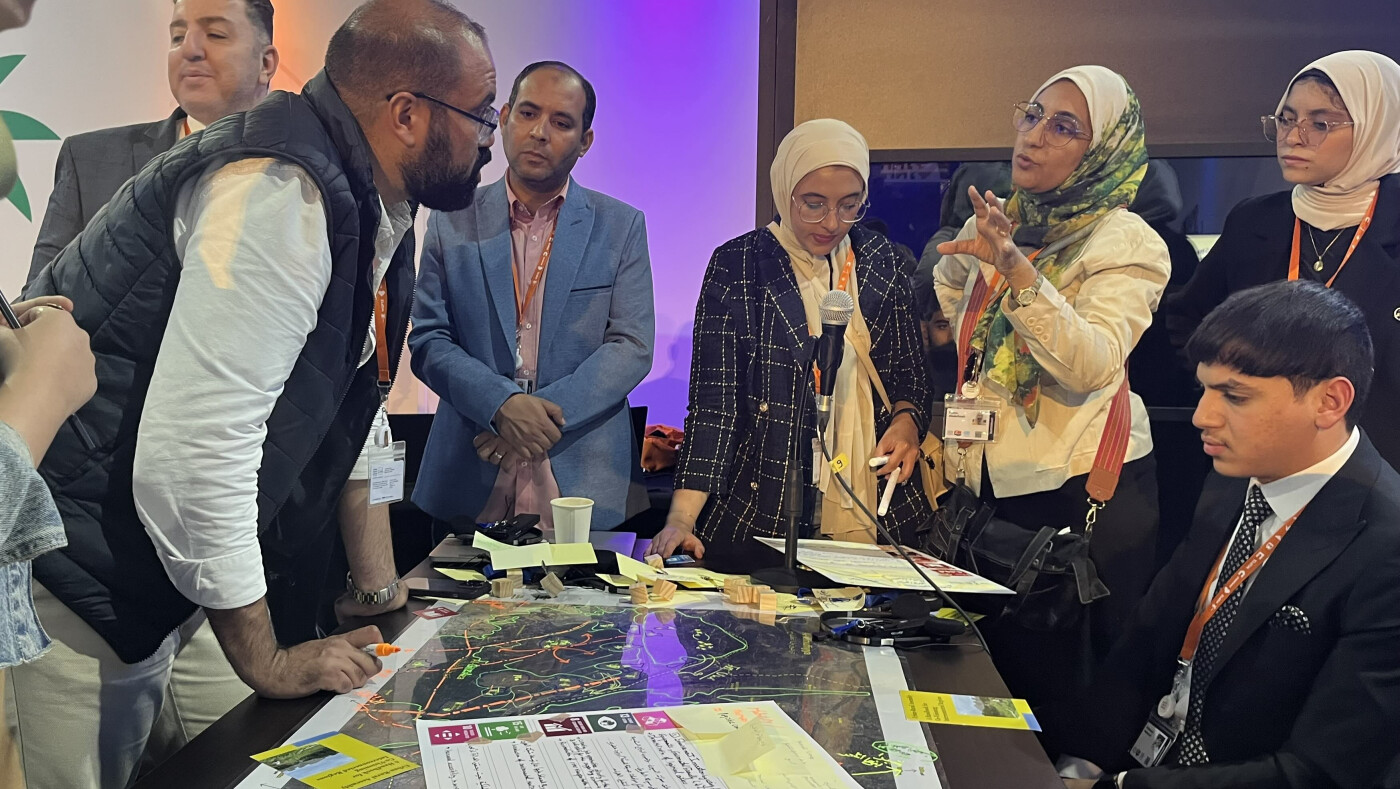
The Urban-Rural Assembly research project was represented at several events at the World Urban Forum in Cairo. At the centre of these were two events hosted by the URA project itself: First, a training session on the Urban-Rural Co-Visioning methodology and second, a film screening and discussion of the second, recently completed URA film production.
Training Session: 'Spatial Co-Visioning and Stakeholder Engagement in the Urban-Rural Interface: Methods, Tools, and Processes'
On November 6, 2024, from 09:00 to 12:00 (Cairo time), URA successfully conducted the training session “Spatial Co-Visioning and Stakeholder Engagement in the Urban-Rural Interface: Methods, Tools and Processes” in collaboration with the Towards Green(er) Egyptian Cities research project and the UN Habitat Urban Policy Platform. The event presented a practical co-visioning approach that engages diverse stakeholders - including policymakers, academics, planners and civil society initiatives - in the sustainable transformation of urban-rural regions. Participants gained valuable insights into the methodology and engaged in a simulated interactive workshop setting facilitated by expert trainers.
About 40 participants from Egypt and other regions of the world attended the event. After a welcome and introduction by Anke Hagemann (TU Berlin, Habitat Unit) and Hassan Elmouelhi (TU Berlin, Towards Green(er) Egyptian Cities), Thomas Forster (UN Habitat) briefly presented the UN Habitat Urban-Rural Linkage Programme. This was followed by the premiere screening of the film “Urban-Rural Co-Visioning. How to Shape Regional Futures Together”, which illustrates the methods and approaches of the two co-visioning processes in Nordhausen (Germany) and Huangyan (China). In preparation for the training sessions, Lukas Pappert (TU Berlin, Urban-Rural Assembly) and Hellen Aziz (TU Berlin, Towards Green(er) Egyptian Cities) presented the procedures and the urban-rural interface of Giza and Qaliubya, on which the training session focused.
The training itself lasted 90 minutes. The participants were divided into four workshop groups, two of which were facilitated in English and two in Arabic. Each workshop table was equipped with a map of the viewing room and other materials. After an introductory round, the participants went through four steps in which the co-visioning process was simulated in a quick run-through.
In the first step, the participants jointly collected urban-rural linkages in the Giza-Qaliubya area. These were then clustered to select three particularly relevant linkages for the following steps. The identified linkages included water supply and irrigation, housing and land use, mobility, connectivity and transport, food supply, and social services. In the second step, the spaces, places, infrastructures and actors associated with the rural-urban linkages were mapped. This enabled participants to visualize the rural-urban linkages and identify interrelationships. In a third step, local sustainability goals were defined for the selected rural-urban linkages. These goals were derived from the Sustainable Development Goals (SDGs), which the participants of the World Urban Forum were already familiar with. Finally, in a fourth step, strategies and actions to help achieve the formulated sustainability goals were discussed. After the training sessions, facilitators and participants presented the results of their groups.
The successful implementation of the compact co-visioning training at the World Urban Forum provides further important insights into the transferability of the methodology to other urban-rural contexts and the development of a toolkit to support actors worldwide in shaping sustainable urban-rural linkages. We would therefore like to thank all participants and especially our partners from Ain-Shams University Ciro and Urban Development Fund Egypt for their support in delivering the training.
Film Screening: Urban-Rural Co-Visioning. How to Shape Regional Futures Together
On Friday, November 8, 2024, from 14:45 to 15:15, the URA research project hosted a film screening followed by a discussion at the German WUF booth. The panel consisted of Remy Sietchiping (UN Habitat), Katharina Borgmann (HCU, SURE) and Lukas Pappert (TU Berlin, URA), with Anke Hagemann (TU Berlin, URA) moderating. After the presentation of the recently completed film “Urban-Rural Co-Visioning. How to shape regional futures together”, the panelists discussed with the audience the possibilities of film in transdisciplinary communication, as well as the challenges associated with its implementation.
The panelists shared their experiences in the production and use of film as a communication format. The audiovisual presentation provides a compact and vivid insight into complex research and planning processes, simultaneously linking results and processes. Working with film always involves complex translation processes, as an easily understandable language has to be developed and then visualized accordingly. Despite the effort involved in producing coherent films, the participants emphasized the special value of films for broad communication, as they can reach diverse groups of actors like few other mediums.




